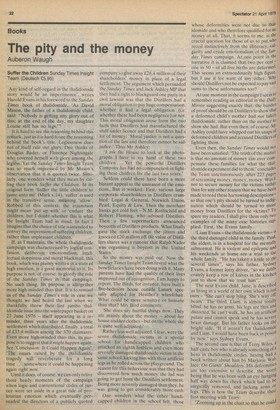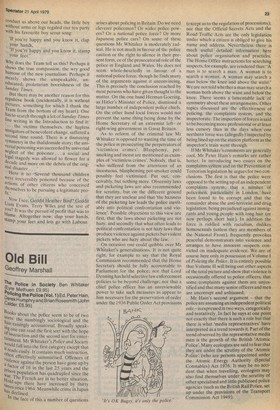The pity and the money
Auberon Waugh
Suffer the Children Sunday Times Insight Team (Deutsch £5.95) Any kind of self-regard in the thalidomide story would be an impertinence', writes Harold Evans in his foreword to the Sunday Times book of thalidomide. 'As David Mason, the father of a thalidomide child, said: "Nobody is getting any glory out of this; at the end of the day, my daughter Louise still has no legs."
It is hard to see the reasoning behind this remark, just as it is hard to see the reasoning behind the book's title. Leglessness does not of itself rule out glory. One thinks of Douglas Bader. or Florence Nightingale who covered herself with glory among the legless. Yet the Sunday Times Insight Team was so much impressed by Mr Mason's observation that it is quoted twice. Similarly. one wonders what they mean by calling their book Suffer the Children. In its original form 'Suffer the little children to come unto me' (Mark x.14). 'suffer' is used in the transitive sense, meaning 'allow'. Robbed of this context, the injunction might mean 'put up with' or 'endure' the children. but I doubt whether this is what the Insight Team had in mind. In fact I imagine that the choice of title is intended to convey the impression of suffering children. rather than unpleasant children.
If, as I maintain, the whole thalidomide campaign was characterised by logical confusion. deliberate emotionalism, intellectual sloppiness and moral blackmail, this book, which was plainly written in a state of high emotion. is a good memorial to it. Its purpose is not. of course, to glorify the role of the Sunday Times in that campaign. No such thing. Its purpose is altogether more high-minded than that. It is to remind us of the Sunday Times's role in case we thought we had heard the last when we thankfully threw their last jumbo thalidomide issue into the wastepaper basket on 27 June 1976 itself appearing as a reminder, three years after the thalidomide settlement which distributed, finally, a total of £33.4 million among the 370 claimants. Even more high-minded than this, its purpose is to suggest that it might happen again. See 'Conclusion: It Could Happen Again'. 'The issues raised by the thalidomide tragedy will reverberate for a long time . . somewhere it could be happening again right now.'
Until it does, of course. we can only relive those heady moments of the campaign when logic and conventional codes of justice were set aside in a great tide of proletarian emotion which eventually persuaded the directors of a publicly quoted company w give away £28.4 million of their shareholders' money in place of a legal settlement. The argument which persuaded the Sunday Times and Jack Ashley MP that they had a right to blackguard one party in a civil lawsuit was that the Distillers had a 'floral obligation to pay huge compensation. whether it had a legal obligation (i.e. whether there had been negligence) or not. This moral obligation arose from the two facts that Distillers had manufactured the stuff under licence and that Distillers had a lot of money: 'Moral justice is not a question of the law and therefore cannot be sub judice.' Thus Mr Ashley: 'I ask the House to look at the photographs I have in my hand of these two children . . . Yet the powerful Distillers Company has had no compunction in fighting these children for the last two years.'
Seldom could there have been a more blatant appeal to the unreason of the emotions. But it worked. First, various large corporate shareholders in Distillers crumbled: Legal & General, Norwich Union, Pearl, Equity & Law. Then the merchant banks got cold feet N.M. Rothschild and Robert Fleming, who advised Distillers. Then a few supermarkets announced boycotts of Distillers products. What finally gave the stock exchange the jitters and knocked £20 million off the value of Distillers shares was a rumour that Ralph Nader was organising a boycott in the United States.
So the money was paid out. Now the Sunday Times Insight Team reveal what the beneficiaries have been doing with it. Many parents have had the quality of their lives improved out of recognition. I am happy to report. The Birds, for instance, have built a five-bedroom house outside Lanark specially adapted for Heather's wheelchair. What could be more sensitive or humane than that? Mrs Bird comments: 'She does say hurtful things now. They are mainly about the money about her house and her clothes but on the whole she is quite well adjusted.'
Rather less well adjusted. I fear, were the seven thalidomide victims in a special school for handicapped children who attacked an eighth limbless and even more severely damaged thalidomide victim in the same school, kicking him with their artificial legs as he rolled across the playground. The reason for this behaviour was that they had discovered how much money the lad was going to get from the Distillers settlement. Being more severely damaged than they, he was going to get considerably more cash.
One wonders what the other handicapped children in the school felt, those whose, deformities were not due to thalidomide and who therefore qualified for no money at all. That, it seems to me, is the crucial question for those of us to put who recoil instinctively from the illiteracy, vulgarity and crude emotionalism of the Sure day Times campaign. At one point in the narrative it is claimed that two per cent one in 50 of all live births are deformed. This seems an extraordinarily high figure. but I use it for want of any other. WhY should Distillers not he expected to pay vast sums to these unfortunates too?
At one moment in the campaign I seem to remember reading an editorial in the DailY Mirror suggesting exactly that: the burden of proof should be on Distillers to show that a deformed child's mother had not taken thalidomide, rather than on the mother to show she had. But even then, of course. Mr Ashley could have whipped out his snaps of deformed children and accused Distillers of fighting them.
Even then, the Sunday Times would not have been satisfied. 'The truth of the matter is that no amount of money can ever coin' pensate these families for what the thalidomide experiment did to them,' concludes the Team sanctimoniously, after 223 pages of screaming money. money, money. Was it not to secure money for the victims rather than for any other reason that we have been made to read these harrowing descriptions so that one's pity should be turned to indignation which should be turned to more money from Distillers for the victims? To spare my readers, I shall give them only two examples of the many case histories supplied. First, the Evans family. 'Liam Evans the thalidomide victim is the third damaged child in the family. Paul. the eldest, is in a hospital for the mentallY subnormal. He is violent and epileptic and his weekends at home are a trial to the whole family. "He has taken a knife to me several times", says his father, SydneY Evans, a former lorry driver, "so we deliberately keep a row of knives in the kitchen just to show that we trust him".' The next Evans child. June, is described as living in a world of her own which is n0,t ours 'She can't stop lying. She's way 05 beam'. The third, Liam, is almost totallY blind, he has no arms, his legs are thin and distorted, he can't walk, he has an artificial palate and cannot speak and he has severe brain damage. But his father looks on the bright side. 'If it weren't for thalidomide and Liam. I would have been back in prison by now.' says Sydney Evans. The second case is that of Terry Wiles, a half-caste boy who is already something of a hero in thalidomide circles, having had 3 book written about him by Marjorie %Val" lace: On Giants' Shoulders. His deformities are too extensive to describe, the worst being that he was born with an eye hanging half way down his cheek which had to be surgically removed, and lacking arms or legs. This is how the Team describe their first meeting with Terry: 'Zooming up in the chair so that he could conduct us above our heads, the little boy Without arms or legs regaled our tea party with his favourite boy scout song: 'If you're happy and you know it, clap your hands, 'If you're happy and you know it, stamp Your feet.'
Why does the Team tell us this? Perhaps it Shows the true compassion. the wry good humour of the new journalism. Perhaps it merely shows the unspeakable, uneducated; proletarian boorishness of the Sunday Times.
But there may be another reason for this repulsive book (incidentally, it is without Pictures, something for which I thank the Team from the bottom of my heart). One has to search through a lot of Sunday Times fine writing in the Introduction to find it: .. the victims themselves, the hapless instigators of benevolent change, suffered a second time round. There is a dismaying Vinmetry in the thalidomide story; the universal poisoning was succeeded by universal neglect of the poisoner . . . a social and legal tragedy was allowed to flower for a decade and more on the debris of the original disaster . . • Here it is 'Several thousand children were irreversibly poisoned because of the actions of other citizens who conceived fit.themselves to be pursuing a legitimate pro No I see. Geddit Heather Bird? .Geddit Liam Evans, Terry Wiles and the rest of You? It was the pursuit of profit that was to blame. Altogether now, clap your hands, stamp your feet and lets go with Labour.







































 Previous page
Previous page